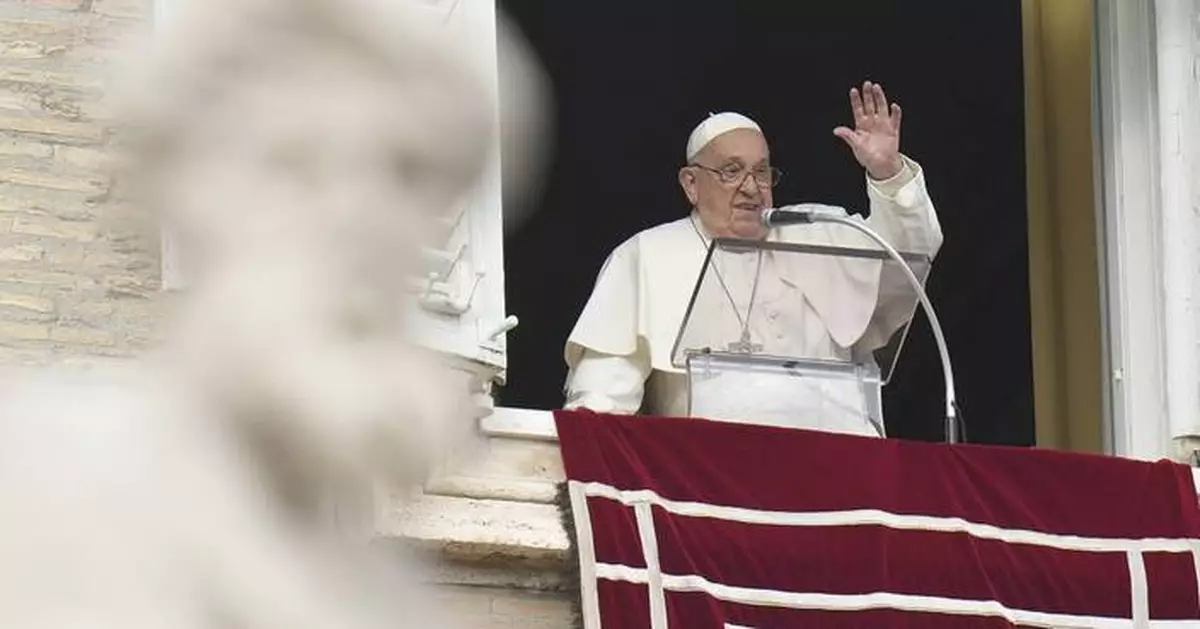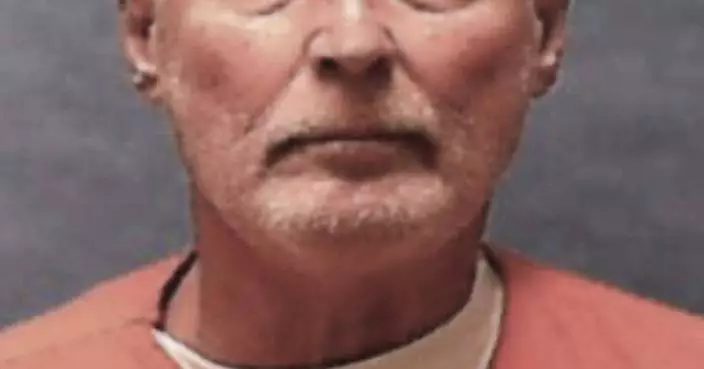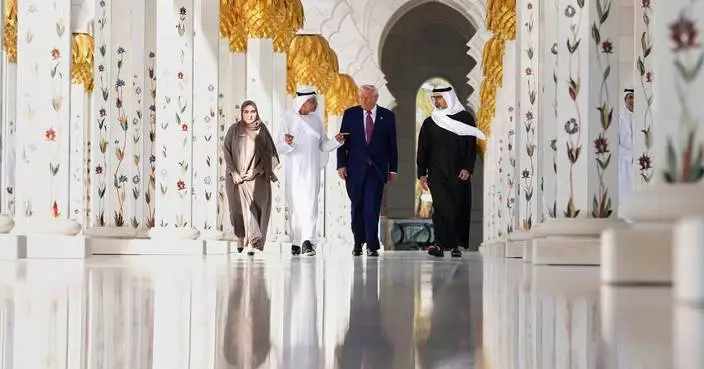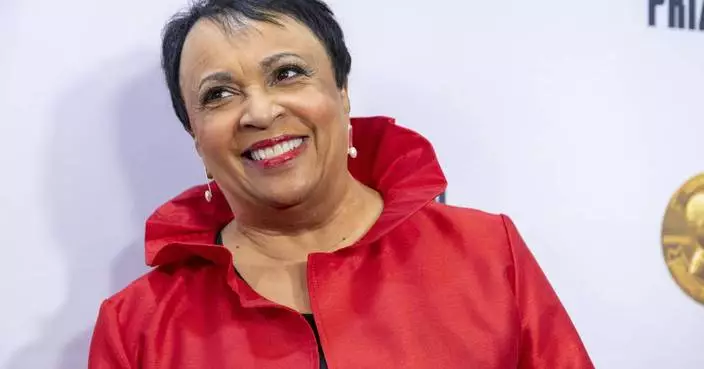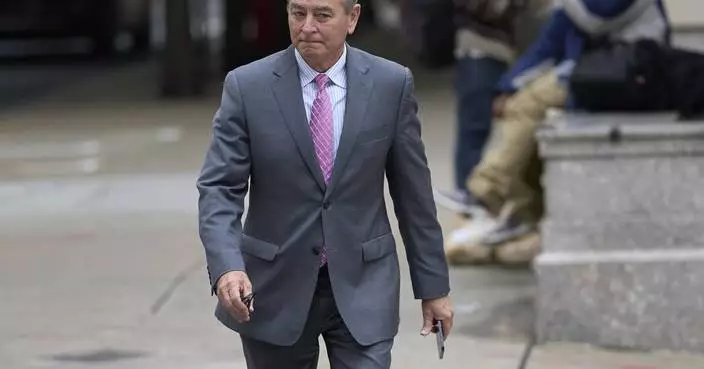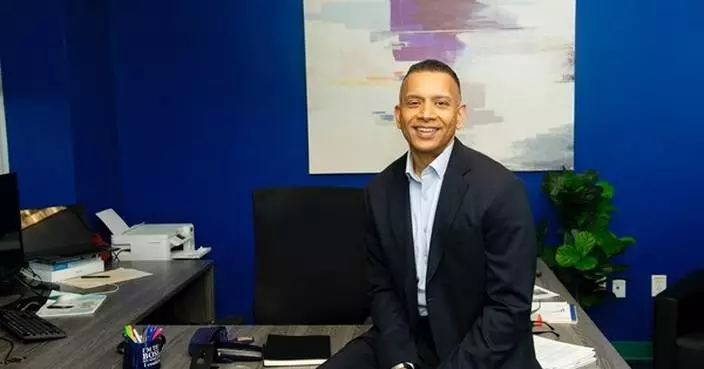ROME (AP) — Pope Francis on Monday named the first woman to head a major Vatican office, appointing an Italian nun, Sister Simona Brambilla, to become prefect of the department responsible for all the Catholic Church's religious orders.
The appointment marks a major step in Francis’ aim to give women more leadership roles in governing the church. While women have been named to No. 2 spots in some Vatican offices, never before has a woman been named prefect of a dicastery or congregation of the Holy See Curia, the central governing organ of the Catholic Church.
The historic nature of Brambilla’s appointment was confirmed by Vatican Media, which headlined its report “Sister Simona Brambilla is the first woman prefect in the Vatican.”
The office is one of the most important in the Vatican. Known officially as the Dicastery for the Institutes of Consecrated Life and Societies of Apostolic Life, it is responsible for every religious order, from the Jesuits and Franciscans to the Mercy nuns and smaller newer movements.
The appointment means that a woman is now responsible for the women who do much of the church's work — the world's 600,000 Catholic nuns — as well as the 129,000 Catholic priests who belong to religious orders.
“It should be a woman. Long ago it should have been, but thank God,” said Thomas Groome, a senior professor of theology and religious education at Boston College who has long called for the ordination of women priests. "It’s a small step along the way but symbolically, it shows an openness and a new horizon or possibility.”
Groome noted that nothing theologically would now prevent Francis from naming Brambilla a cardinal, since cardinals don't technically have to be ordained priests.
Naming as a cardinal “would be automatic for the head of a dicastery if she was a man,” he said.
But in an indication of the novelty of the appointment and that perhaps Francis was not ready to go that far, the pope simultaneously named as a co-leader, or “pro-prefect,” a cardinal: Ángel Fernández Artime, a Salesian.
The appointment, announced in the Vatican daily bulletin, lists Brambilla first as “prefect” and Fernández second as her co-leader. Theologically, it appears Francis believed the second appointment was necessary since the head of the office must be able to celebrate Mass and perform other sacramental functions that currently can only be done by men.
Natalia Imperatori-Lee, chair of the religion and philosophy department at Manhattan University, was initially excited by Brambilla’s appointment, only to learn that Francis had named a male co-prefect.
“One day, I pray, the church will see women for the capable leaders they already are,” she said. “It’s ridiculous to think she needs help running a Vatican dicastery. Moreover, for as long as men have been in charge of this division of Vatican governance, they have governed men’s and women’s religious communities.”
Brambilla, 59, is a member of the Consolata Missionaries religious order and had served as the No. 2 in the religious orders department since 2023. She takes over from the retiring Cardinal Joao Braz de Aviz, 77.
Francis made Brambilla’s appointment possible with his 2022 reform of the Holy See’s founding constitution, which allowed laypeople, including women, to head a dicastery and become prefects.
Brambilla, a nurse, worked as a missionary in Mozambique and led her Consolata order as superior from 2011-2023, when Francis made her secretary of the religious orders department.
One major challenge she will face is the plummeting number of nuns worldwide. It has fallen by around 10,000 a year for the past several years, from around 750,000 in 2010 to 600,000 last year, according to Vatican statistics.
Brambilla's appointment is the latest move by Francis to show by example how women can take leadership roles within the Catholic hierarchy, albeit without allowing them to be ordained as priests.
Catholic women have long complained of second-class status in an institution that reserves the priesthood for men.
Francis has upheld the ban on female priests and tamped down hopes that women could be ordained as deacons.
But there has been a marked increase in the percentage of women working in the Vatican during his papacy, including in leadership positions, from 19.3% in 2013 to 23.4% today, according to statistics reported by Vatican News. In the Curia alone, the percentage of women is 26%.
Among the women holding leadership positions are Sister Raffaella Petrini, the first-ever female secretary general of the Vatican City State, responsible for the territory’s health care system, police force and main source of revenue, the Vatican Museums, which are led by a laywoman, Barbara Jatta.
Another nun, Sister Alessandra Smerilli, is the No. 2 in the Vatican development office while several women have been appointed to under-secretary positions, including the French nun, Sister Nathalie Becquart, in the synod of bishops' office.
Associated Press religion coverage receives support through the AP’s collaboration with The Conversation US, with funding from Lilly Endowment Inc. The AP is solely responsible for this content.

Pope Francis kisses the baby Jesus as he presides over an Epiphany mass in St.Peter's Basilica, at the Vatican, Monday, Jan. 6, 2025. (AP Photo/Alessandra Tarantino)
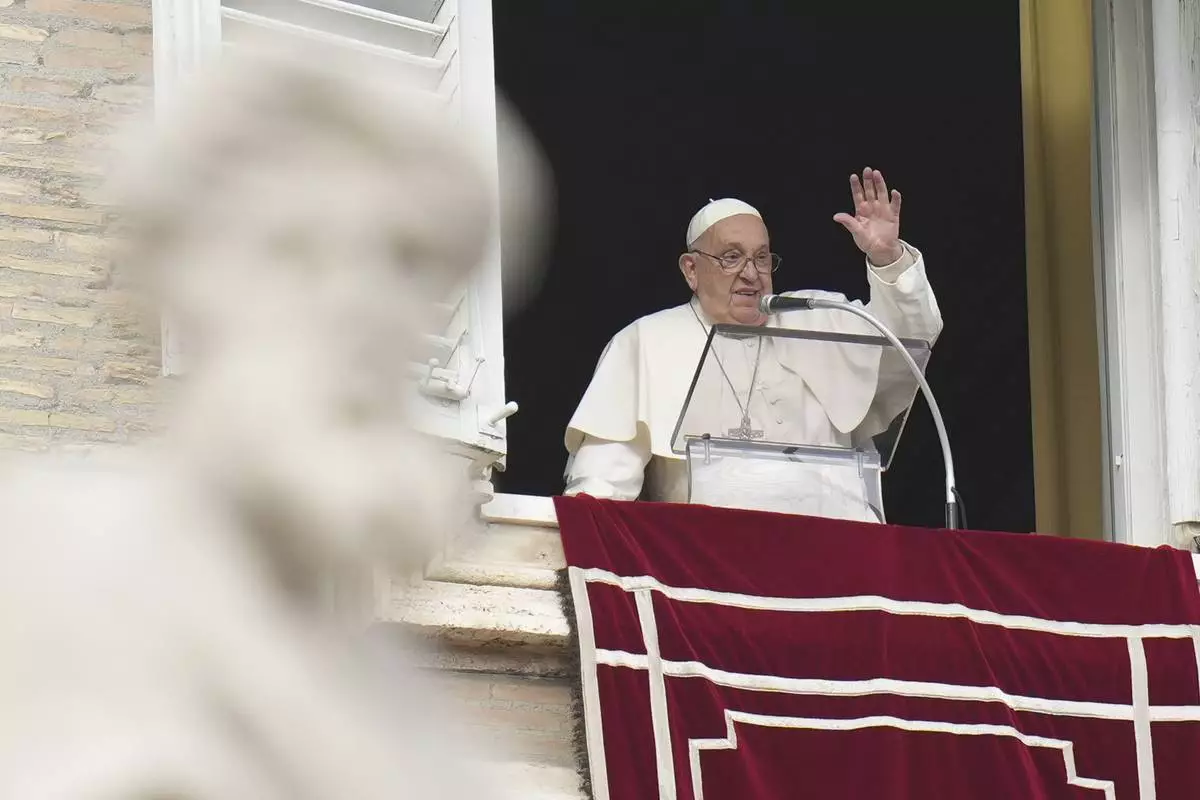
Pope Francis waves during the Angelus noon prayer on the occasion of the Epiphany day from the window of his studio overlooking St.Peter's Square, at the Vatican, Monday, Jan. 6, 2025. (AP Photo/Alessandra Tarantino)
DEIR AL-BALAH, Gaza Strip (AP) — Israel launched dozens of airstrikes across Gaza on Friday that local health officials said killed 108 people, mostly women and children, and which Israeli officials described as a prelude to a stepped-up campaign to pressure Hamas to release hostages.
Israel also struck two ports in Yemen that it said were used by the Houthi militant group to transfer weapons. Local health officials said at least one person was killed and nine injured.
The strikes across the Gaza Strip followed days of attacks that killed more than 130 people, according to Gaza’s Health Ministry, which does not distinguish between civilians and combatants, and came as U.S. President Donald Trump wrapped up a visit to the region that included stops in three Gulf states but not Israel.
There had been widespread hope that Trump's trip could increase the chances of a ceasefire deal or the resumption of humanitarian aid to Gaza, which Israel has prevented for more than two months. The Trump administration is also trying to negotiate a nuclear deal with Iran, which backs several anti-Israel militant groups, including Hamas in Gaza and the Houthis in Yemen.
Speaking to reporters in Abu Dhabi on the final day of his trip, Trump said he was looking to resolve a range of global crises, including Gaza. “We’re looking at Gaza,” he said. “And we’ve got to get that taken care of. A lot of people are starving. A lot of people are — there’s a lot of bad things going on.”
The Gaza Health Ministry said 31 children and 27 women were killed and hundreds more wounded in Friday’s airstrikes.
In southern Gaza, Israel struck the outskirts of Deir al-Balah and the city of Khan Younis. It said it hit anti-tank missile posts and military structures.
Three children and their grandfather were killed as they fled bombardment in Khan Younis, said the head of pediatrics at Nasser Hospital, Dr. Ahmed al-Farra.
In northern Gaza, the attacks sent people fleeing from the Jabaliya refugee camp and the town of Beit Lahiya. Israel said it eliminated several militants who were operating in an observation compound.
Dark smoke was seen rising over Jabaliya as people fled on donkey carts, by car and foot.
“We got out of the house with difficulty, killing and death, we did not take anything,” said Feisal Al-Attar, who was displaced from Beit Lahiya.
After the strikes on Yemen, Israeli Prime Minister Benjamin Netanyahu said, “There will be more to come.” The Israeli military, which attacked Houthi targets earlier this month, said it had intercepted several missiles fired from Yemen toward Israeli airspace during Trump’s visit to the region.
An Israeli official said the latest strikes in Gaza were part of the lead-up to a larger operation that it warned would begin soon if Hamas doesn't release the 58 hostages still in Gaza since the group's October 2023 attack that launched the war. The official was not authorized to brief media and spoke on condition of anonymity.
Netanyahu vowed earlier in the week to escalate pressure on Hamas with the aim of destroying the militant group that has ruled Gaza for nearly two decades. In comments released by his office Tuesday, the prime minister said Israeli forces were days away from entering Gaza “with great strength to complete the mission.”
Israeli Defense Minister Israel Katz confirmed Friday that strikes in Gaza earlier in the week targeted the presumed leader of Hamas' military wing in Gaza, Mohammed Sinwar, although there has been no word on his fate. He is the brother of the slain former leader in Gaza, Yahya Sinwar — a mastermind of the Oct. 7, 2023, attack.
In Israel, a group that supports the families of hostages said they awoke Friday with “heavy hearts” to reports of increased attacks and called on Netanyahu to “join hands” with Trump’s efforts to free hostages. On Monday, Israeli-American Edan Alexander was released after backdoor U.S.-Hamas diplomacy.
In the Oct. 7 attack, Hamas-led militants killed 1,200 people and abducted 251 others. Israel’s retaliatory offensive has killed more than 53,000 Palestinians, many of them women and children, according to Gaza’s Health Ministry.
Almost 3,000 have been killed since Israel broke a ceasefire on March 18, the ministry said.
Of the hostages that remain in Gaza, Israel believes as many as 23 are still alive, although Israeli authorities have expressed concern for the status of three of those.
Dozens of Palestinians in Khan Younis lined up at a charity kitchen Friday in a scene that quickly turned chaotic as the enclave entered its third month of Israel’s aid blockade.
Several children behind a metal partition screamed and cried out for food. At one point, charity kitchen workers struggled to push people back into line.
Some workers were attacked as the crowd surged forward, pressing against the partition and lunging toward the large pots of rice to grab whatever they could.
Israel's blockade is preventing food, fuel medicine and all other supplies from entering, worsening a humanitarian crisis. Israel says the blockade aims to pressure Hamas to release the hostages it still holds.
“Our only hope was that Donald Trump’s visit to the Middle East would result in solutions and somehow open crossings to bring in humanitarian assistance as soon as possible into the Gaza Strip,” said Saqer Jamal, a displaced man from Rafah who was at the kitchen.
The United Nations announced Friday that 18 kitchens previously closed due to food shortages in Gaza reopened after community members shared remaining food stocks.
Earlier this week, a new humanitarian organization that has U.S. backing to take over aid delivery said it expects to begin operations before the end of the month — after what it describes as key agreements from Israeli officials.
A statement from the group, the Gaza Humanitarian Foundation, identified several U.S. military veterans, former humanitarian coordinators and security contractors that it said would lead the delivery effort.
Many in the humanitarian community, including the U.N., said they won't participate because the system does not align with humanitarian principles and won't be able to meet the needs of Palestinians in Gaza.
——
Mroue reported from Beirut. Associated Press writers Tia Goldenberg and Sam Mednick in Tel Aviv, Israel, contributed to this report.
——
Follow AP’s war coverage at https://apnews.com/hub/israel-hamas-war

Displaced Palestinians fleeing Beit Lahia amid ongoing Israeli military operations in the Gaza Strip arrive in Jabalia, northern Gaza, on Friday, May 16, 2025. (AP Photo/Jehad Alshrafi)

Smoke rises following an Israeli army airstrike in northern Gaza Strip, seen from southern Israel, Friday, May 16, 2025. (AP Photo/Maya Alleruzzo)

An Israeli tank moves in a staging area in southern Israel, near the border with Gaza, Friday, May 16, 2025. (AP Photo/Maya Alleruzzo)

Displaced Palestinians fleeing Beit Lahia amid ongoing Israeli military operations in the Gaza Strip arrive in Jabalia, northern Gaza, on Friday, May 16, 2025. (AP Photo/Jehad Alshrafi)

Palestinians struggle to get donated food at a community kitchen in Khan Younis, Gaza Strip, Friday, May 16, 2025. (AP Photo/Abdel Kareem Hana)

Palestinians struggle to get donated food at a community kitchen in Khan Younis, Gaza Strip, Friday, May 16, 2025. (AP Photo/Abdel Kareem Hana)

Palestinians look at smoke rises following an Israeli airstrike near Jabalia, northern Gaza Strip, Friday, May 16, 2025. (AP Photo/Jehad Alshrafi)

Displaced Palestinians fleeing Beit Lahia amid ongoing Israeli military operations in the Gaza Strip arrive in Jabalia, northern Gaza, on Friday, May 16, 2025. (AP Photo/Jehad Alshrafi)

Displaced Palestinians fleeing Beit Lahia amid ongoing Israeli military operations in the Gaza Strip arrive in Jabalia, northern Gaza, on Friday, May 16, 2025. (AP Photo/Jehad Alshrafi)

Displaced Palestinians fleeing Beit Lahia amid ongoing Israeli military operations in the Gaza Strip arrive in Jabalia, northern Gaza, on Friday, May 16, 2025. (AP Photo/Jehad Alshrafi)

Displaced Palestinians fleeing Beit Lahia amid ongoing Israeli military operations in the Gaza Strip arrive in Jabalia, northern Gaza, on Friday, May 16, 2025. (AP Photo/Jehad Alshrafi)

Displaced Palestinians fleeing Beit Lahia amid ongoing Israeli military operations in the Gaza Strip arrive in Jabalia, northern Gaza, on Friday, May 16, 2025. (AP Photo/Jehad Alshrafi)

Palestinians struggle to get donated food at a community kitchen in Jabalia, northern Gaza Strip, Thursday, May 15, 2025. (AP Photo/Jehad Alshrafi)

Palestinians struggle to get donated food at a community kitchen in Jabalia, northern Gaza Strip, Thursday, May 15, 2025. (AP Photo/Jehad Alshrafi)

Smoke rises following an Israeli airstrike in the Gaza Strip, as seen from southern Israel, Thursday, May 15, 2025. (AP Photo/Ariel Schalit)

Palestinians struggle to get donated food at a community kitchen in Jabalia, northern Gaza Strip, Thursday, May 15, 2025. (AP Photo/Jehad Alshrafi)

Israeli soldiers work on tanks and APCs at a staging area near the border with the Gaza Strip, in southern Israel, Thursday, May 15, 2025. (AP Photo/Ariel Schalit)




